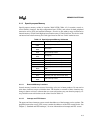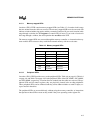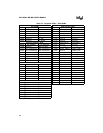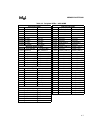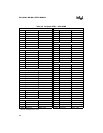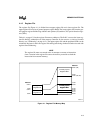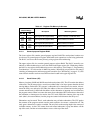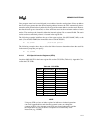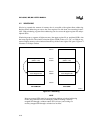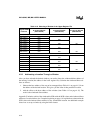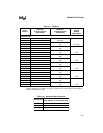
4-11
MEMORY PARTITIONS
Your program must load a word-aligned (even) address into the stack pointer. Select an address
that is two bytes greater than the desired starting address because the CPU automatically decre-
ments the stack pointer before it pushes the first byte of the return address onto the stack. Remem-
ber that the stack grows downward, so allow sufficient room for the maximum number of stack
entries. The stack must be located in either the internal register file or external RAM. The stack
can be used most efficiently when it is located in the register file.
The following example initializes the top of the upper register file (8XC196MC, MD) as the
stack. (For the 8XC196MH, the immediate value would be #300H.)
LD SP, #200H ;Load stack pointer
The following example shows how to allow the linker locator to determine where the stack fits
in the memory map that you specify.
LD SP, #STACK
4.1.6.3 CPU Special-function Registers (SFRs)
Locations 0000–0017H in the lower register file are the CPU SFRs (Table 4-8). Appendix C de-
scribes the CPU SFRs.
NOTE
Using any SFR as a base or index register for indirect or indexed operations
can cause unpredictable results because external events can change the
contents of SFRs. Also, because some SFRs are cleared when read, consider
the implications of using an SFR as an operand in a read-modify-write
instruction (e.g., XORB).
Table 4-8. CPU SFRs
Address High (Odd) Byte Low (Even) Byte
0016H Reserved Reserved
0014H Reserved WSR
0012H INT_MASK1 INT_PEND1
0010H Reserved Reserved
000EH Reserved Reserved
000CH Reserved Reserved
000AH Reserved WATCHDOG
0008H INT_PEND INT_MASK
0006H PTSSRV (H) PTSSRV (L)
0004H PTSSEL (H) PTSSEL (L)
0002H ONES_REG (H) ONES_REG (L)
0000H ZERO_REG (H) ZERO_REG (L)



